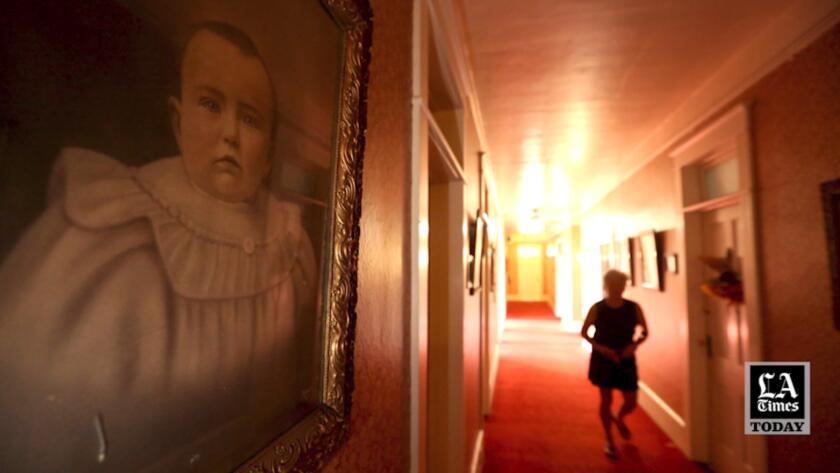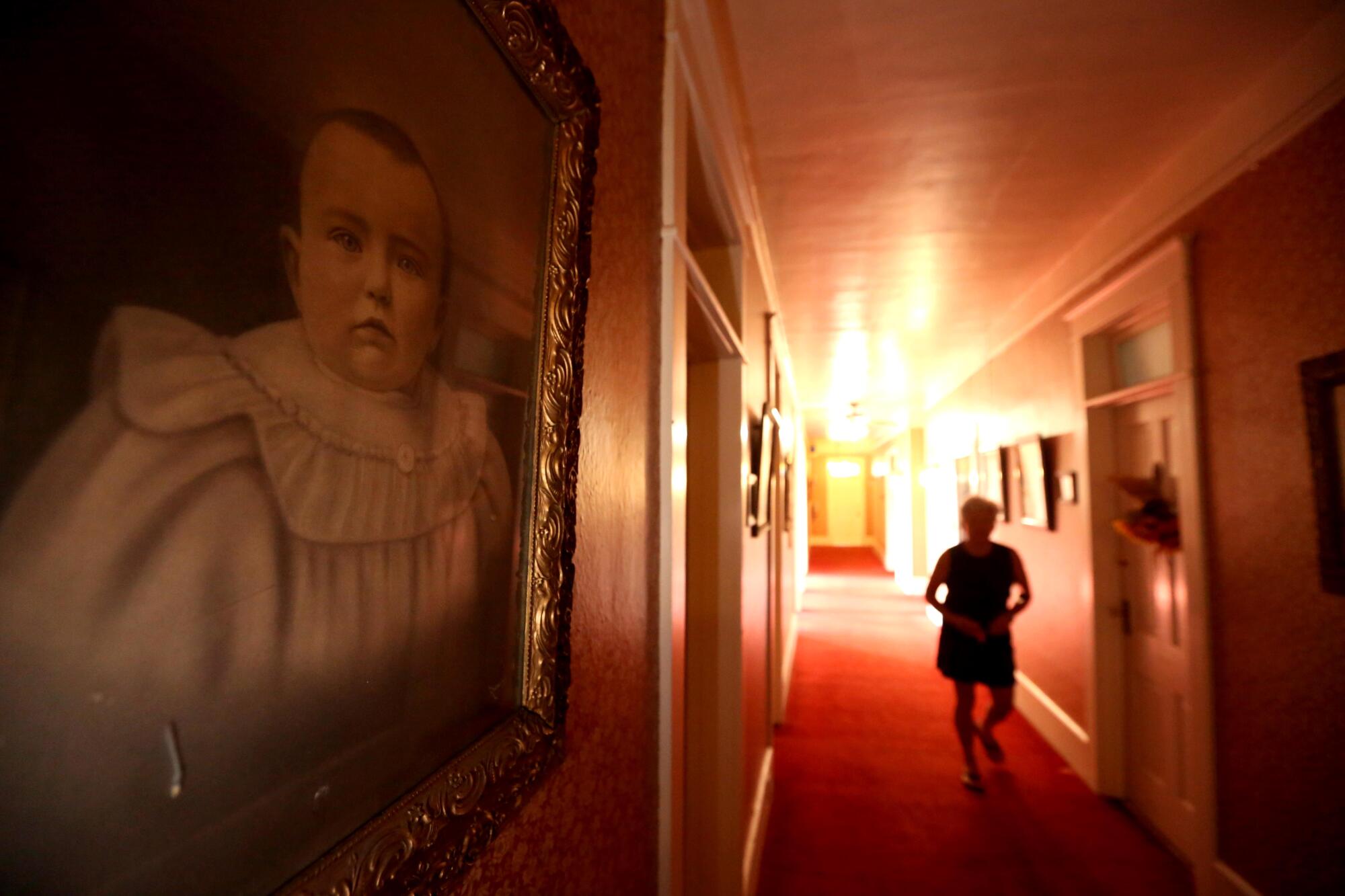
ALTURAS, Calif. — The gals from West Sacramento swigged vodka on an antique floral couch in the Niles Hotel.
As their laughter echoed down the hallway, stern faces glowered from old black-and-white portraits in gilded frames.
The four women had driven five hours north to Alturas, a town of 2,700 in California’s remote northeast corner. They were looking for adventure — and the ghost of an old prostitute said to haunt the hotel.
“Look at the wallpaper peeling over there!” said Mary Bateman, 58, who sells safety equipment for law enforcement officers. “That’s from the little ghosties trying to come through.”
“This is redrum,” she added, referencing the 1980 film “The Shining,” in which a little boy uses lipstick to write “murder” backward on a door in a haunted hotel.
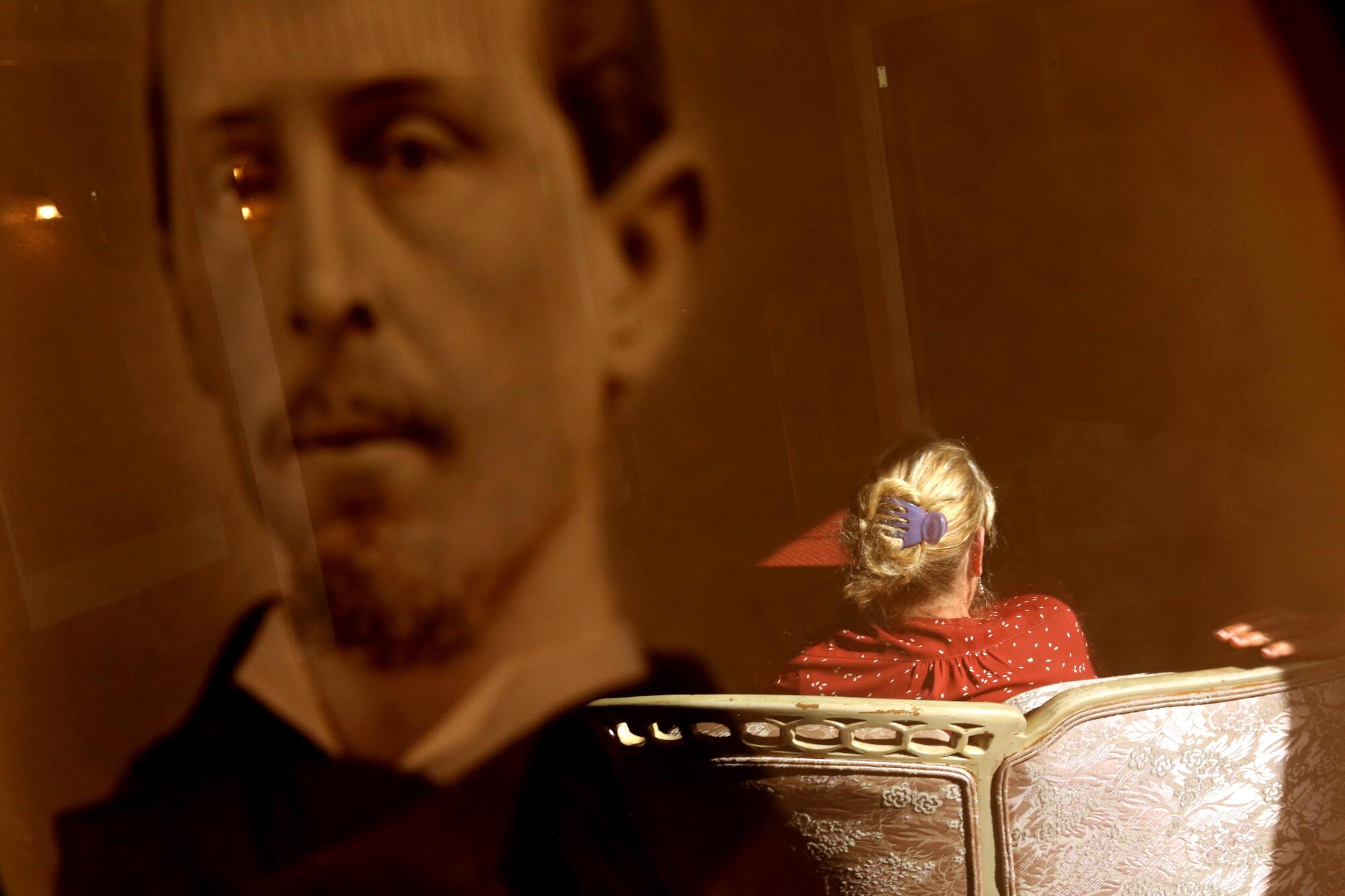
At the 115-year-old Niles Hotel — where ancient bullet holes pock the tin ceiling by the downstairs saloon — getting the creeps is part of the appeal.
Legend has it that the spirit of a bordello girl crawls in bed with gentlemen guests, scratches the walls and stomps around at night.
“She doesn’t care for men,” said Jody Stone, a bartender at the Niles Saloon, with a tone of respect.
In proud but struggling little communities throughout rural Northern California, grand old hotels hark back to when these places were booming Gold Rush towns, timber towns and cow towns. Often lovingly restored, the lodgings invoke a certain nostalgia for more prosperous days and hope for a brighter future.
Oh, and they’re often said to be haunted.
Among the redwoods in Humboldt County, there’s the Scotia Lodge. The 100-year-old hotel — which had deteriorated but was refurbished and reopened in 2021 as a cannabis-friendly resort — allegedly has a spirit on the third floor. Locals call him Frank. They say he’s nice.
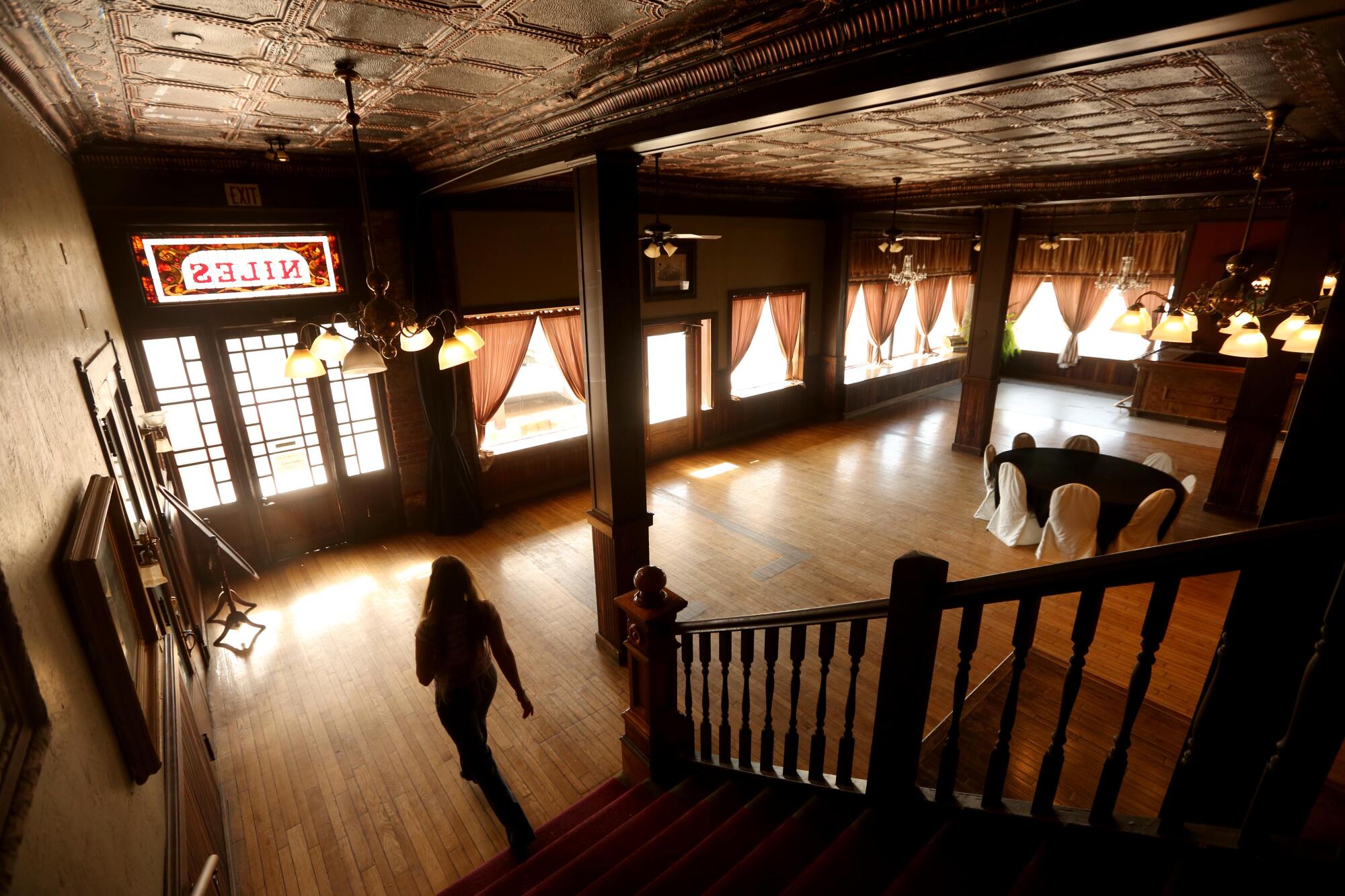
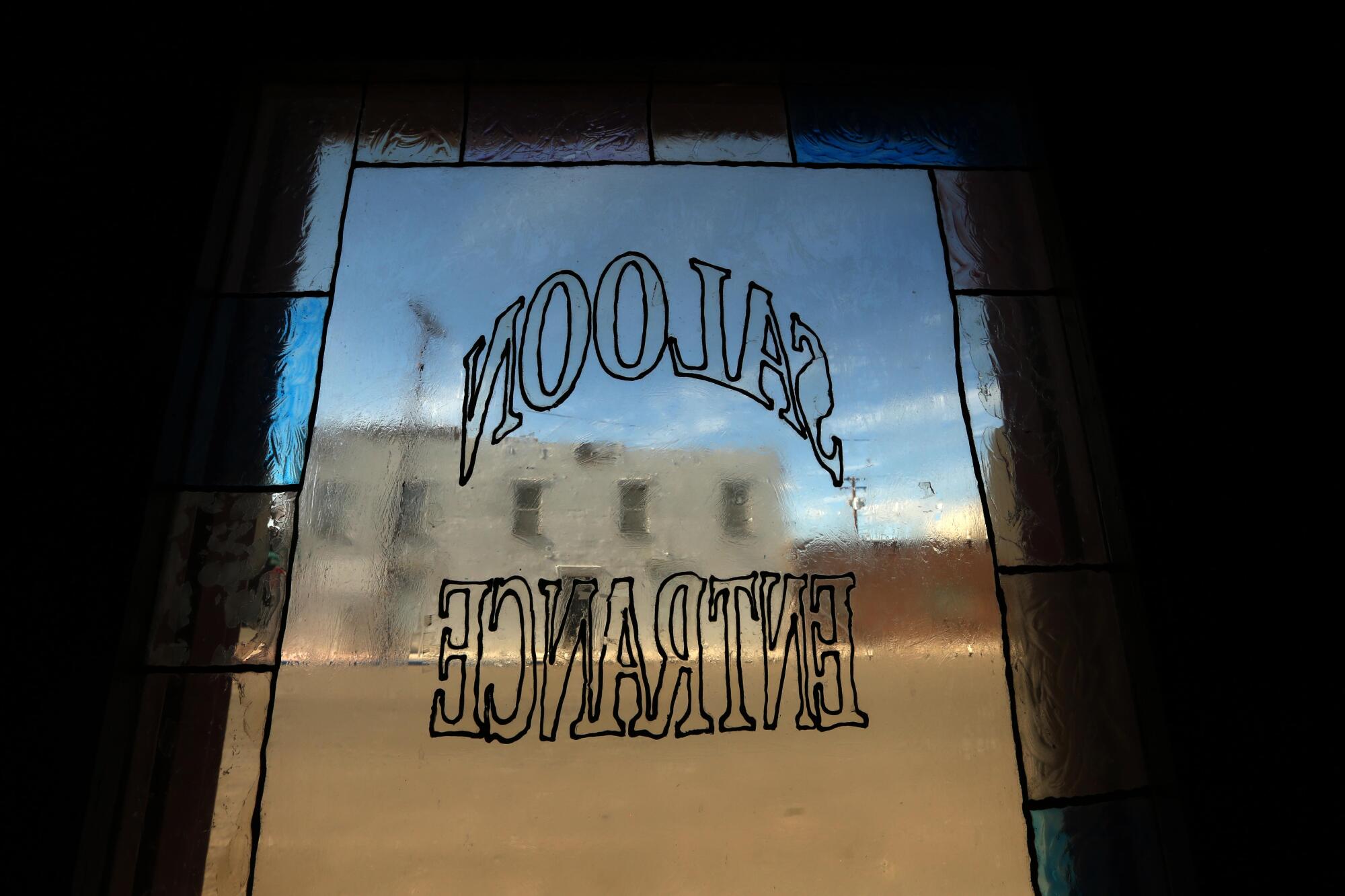
In Placerville, the Historic Cary House Hotel, a stately brick building erected in 1857, is haunted by Stan, described by the El Dorado County Visitors Authority as “a flirty front desk clerk who loved his liquor and had a penchant for pinching the bottoms of hotel guests.” After flirting with someone who didn’t find it cute, poor old Stan was stabbed in the chest and fell down the stairs to his death, or so the story goes.
The 1800s-era Holbrooke Hotel in Grass Valley, renovated and reopened in 2020, is “haunted by rough cowboys and Victorian Madames, their secrets forever safe within the storied walls,” the owners say.
In Trinity County, the owner of the 143-year-old Weaverville Hotel doesn’t like to talk about the ghosts who may or may not dwell there, including that of a 15-year-old girl, the granddaughter of former owners, who died there of typhoid, according to the hotel’s website.
“We probably have a ghost or two here, but I have young women travelers that come to town; they’re by themselves,” said owner Jeanne Muir. “I don’t want them to be worried there might be a ghost.”
Ghost hunters have tried to stay and search for paranormal activity. Muir, 80, has politely told them: No.
The hotel is a jewel of Weaverville’s Gold Rush-era Main Street, also home to the Nugget Restaurant and the Diggins pub. In mountainous Trinity County — where timber crashed and legal marijuana is now doing the same — boosters are working hard to draw tourists.
In Trinity County, boom-and-bust cycles are part of history. Legal weed promised to be an economic shot in the arm. But that expectation quickly collapsed.
Muir, originally from Florida, moved to Weaverville with her husband, Brian, in 1996, so he could work for a gold mine. They bought the hotel in 2002 and spent two years carefully renovating it, maxing out their credit cards and borrowing against their life insurance.
They felt a great responsibility “to keep it as authentic as possible,” Muir said. She filled the place with antiques and doilies and Victorian-era wedding photos — some of which she bought on EBay — with unsmiling brides and grooms.
As for ghosts?
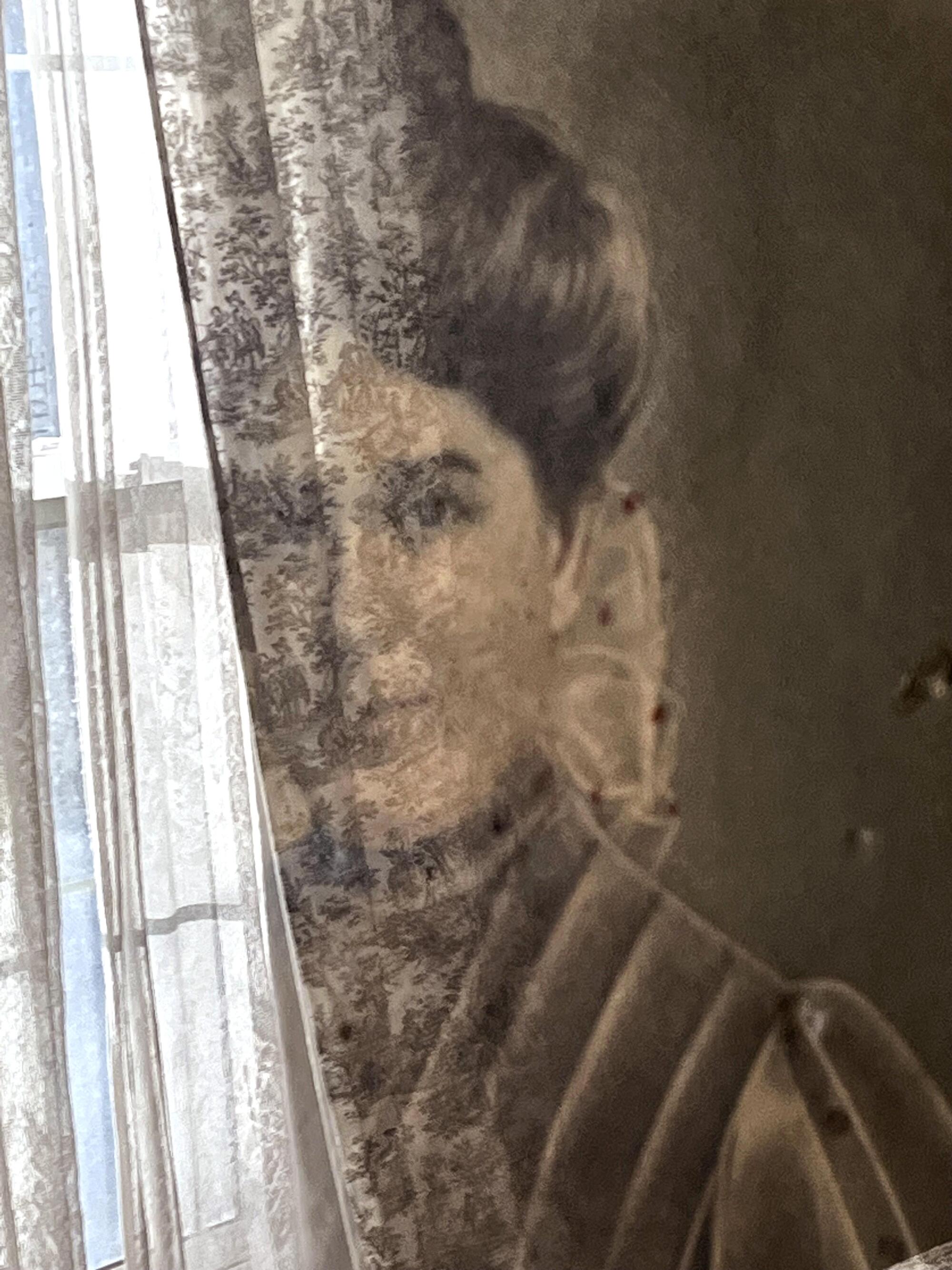
“I’ve been here by myself many, many, many times and would go upstairs,” Muir said. “I’ve never even gotten a creepy feeling on the back of my neck.”
Up in Alturas — where the town motto is “Where the West Still Lives” — the three-story Niles Hotel is the beating heart of a Main Street lined with empty storefronts.
Alturas is the only incorporated city in Modoc, one of the poorest counties in California, where a fifth of the population lives in poverty. It has always been a cattle ranching town, where family roots run deep, said Annette Mohr, a volunteer for the Modoc County Historical Museum who, despite living there for two decades, said, “I’m not a native.”
For years, Mohr has played bridge with girlfriends in the Niles Hotel lobby every week, sitting by the big picture windows, watching people walk by. Over the years, the foot traffic has dwindled.
The hotel, one of the tallest buildings in town, was built in 1908 and catered to cattlemen, loggers, farmers and businessmen. For a time, Alturas had two other big hotels; one burned to the ground, and the other was demolished.
When Jim and Elizabeth Cavasso bought the shuttered Niles in 2011, it had been neglected for more than a decade, he said.
“When I was little — I grew up here — it was a landmark. It was the spot,” said Jim Cavasso, 67, a self-described “community guy” who’s active in the Rotary Club and Chamber of Commerce. “We were just watching it crumble, all the history, our childhood memories.”
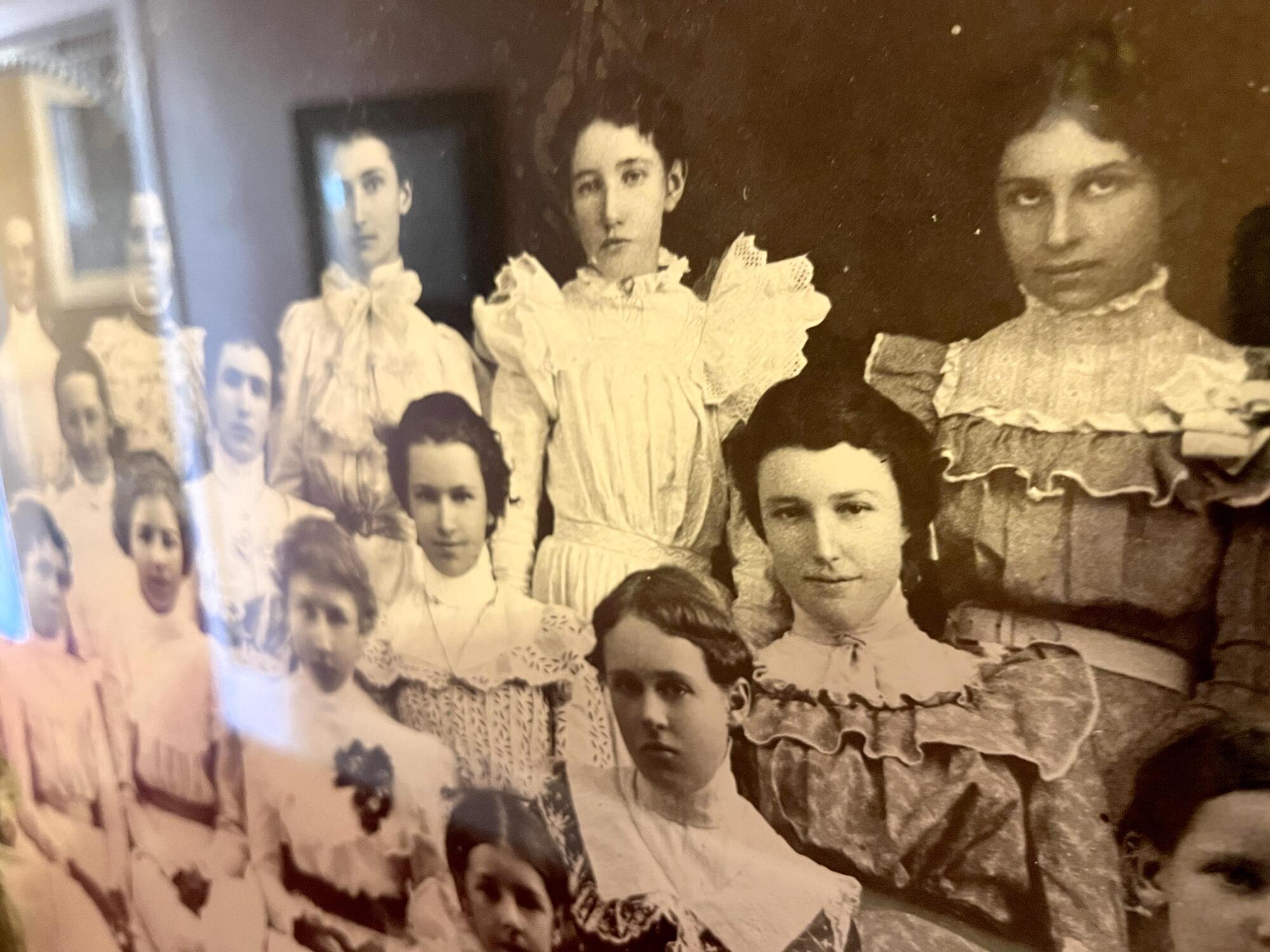
In a small town, he said, you take pride in what you’ve got. And Alturas has the Niles.
The Cavassos bought a building with busted windows, a caving roof, broken pipes. Pigeons and bats had gotten in there; so had some mischievous kids.
There were bees and a giant honeycomb between the walls. (A local beekeeper harvested the honey, and they sold it in the coffee shop downstairs.)
It was too expensive to hire contractors, Cavasso said, so townsfolk helped fix the place up, one room at a time. The guest rooms, which have themes like “Angler Heaven” and “Homestead,” were designed by community members. The exterior got more than 500 gallons of paint.
The work is ongoing.
“That old girl really likes to have her back scratched,” Cavasso said of the building.
Is it haunted? Probably, Cavasso said.
Cavasso said that, at one point, his wife, Elizabeth — a Modoc County supervisor and longtime wildland firefighter — was working on the third floor and saw a ghostly visage.
“Right in front of her face was a woman,” he said. “It was brief, and she was gone.”
Unlike the Weaverville’s owners, Cavasso welcomes the paranormal investigators who visit with their ghost-hunting equipment.
He admits, with a laugh, that some people are creeped out by the Victorian-era portraits — especially a painting of a dour-faced baby in a frilly white smock — that are original to the building. People swear the eyes follow them.
If there really was a prostitute who died at the hotel and now haunts the place, the details are fuzzy.
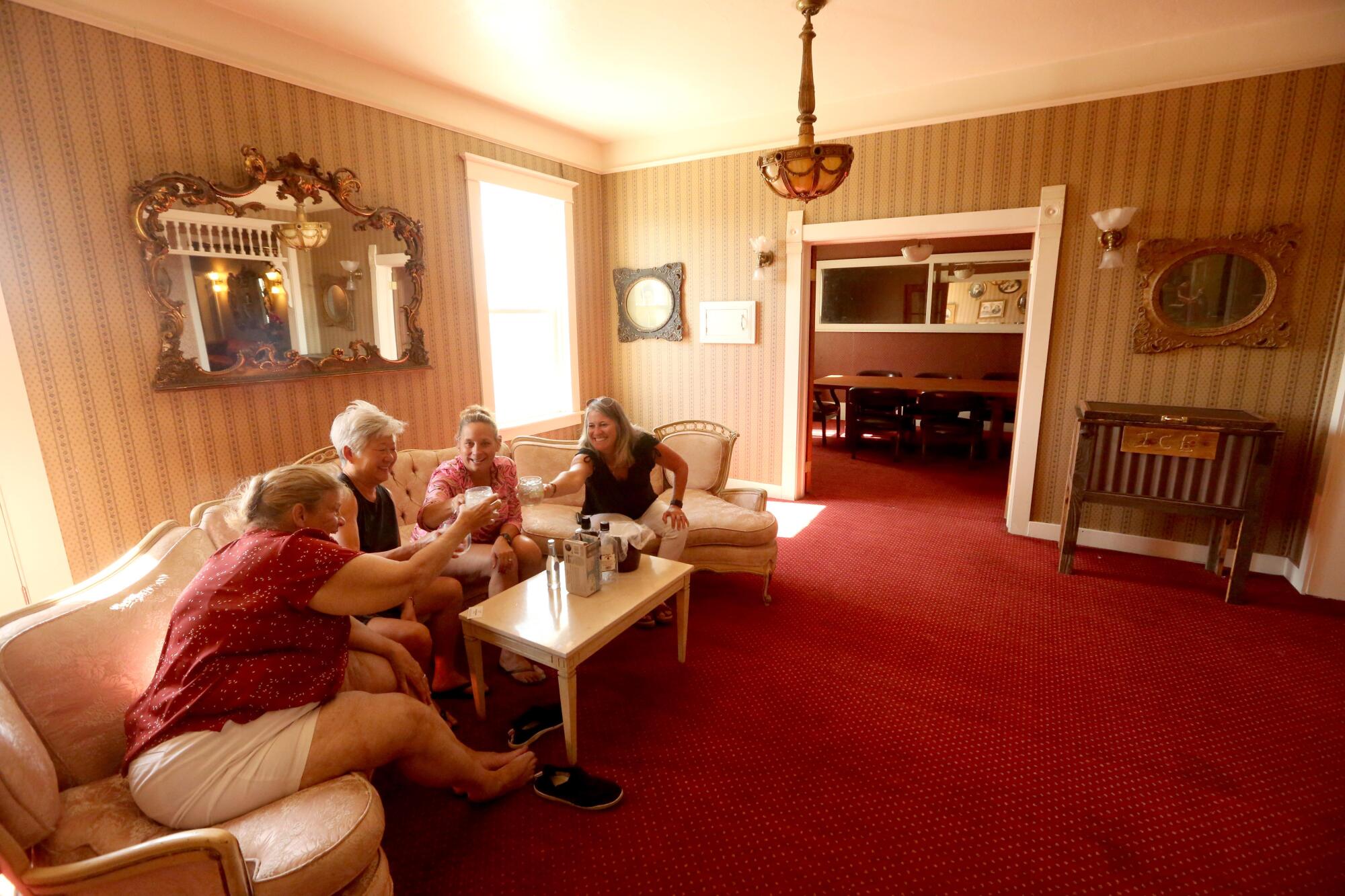
According to a pearl-clutching May 1953 article in the Modoc County Record, the local district attorney proclaimed there were no sex workers in the county after reading “an article in a metropolitan paper” that claimed Alturas was open to prostitution.
“Just when we think we have a nice clean little county, then up pops a story in one of the big town papers which tears down our almost perfect crime record,” the front-page article proclaimed.
But at the hotel saloon, where the scent of wood-burning stoves hangs in the air, the ghost is as real as the polar bear hide hanging on the wall. On a recent Thursday night, Stone, the bartender, recounted the story of one freaked-out male guest.
“He said that he woke up to something tugging his pillow, and he rolled over, and it pushed him down in the bed,” she said. As the guest told her the story, he held out his arm. The hair stood up.
Sitting at the bar was Ruben Martinez, 63, sipping a bottle of Heineken. A member of the Pit River Tribe who grew up in Alturas, he and his late wife had their wedding reception at the Niles in 1993.
He’s talked to male guests who said the ghost rubbed their backs. After some recent construction work, he said, there’s been a lot of “strange activity” — things turning up in different places, doors opening on their own, places that suddenly feel cold.
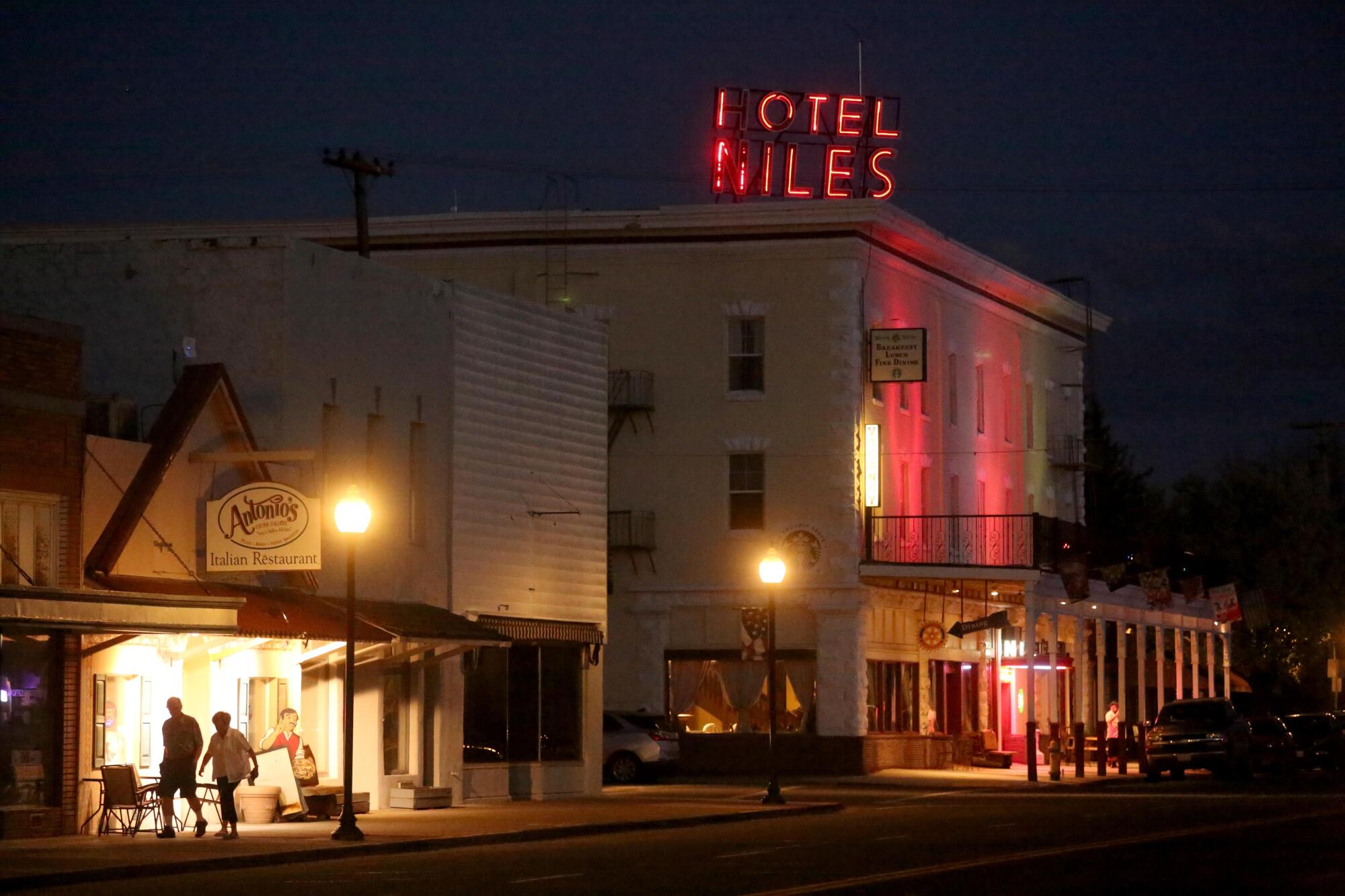
Jason Michael, who is 44 and works in finance, was perched a few bar stools over. During the COVID-19 pandemic two years ago, he and his wife moved with their young daughter to Alturas from Los Angeles. They were lured by the fresh mountain air and inexpensive land, and they could work remotely.
“I love it up here,” he said. “It’s super chill. Slow.”
Michael‘s wife and daughter recently showed him an iPhone video they shot in a hallway at the Niles. They thought they were alone, but when they replayed the video, they heard someone whistling.
They hadn’t heard it while they walked the halls. They are certain it was a ghost.
The four women from West Sacramento chose the Niles precisely because it has character. Bateman was on a work trip, fitting California Highway Patrol officers for body armor. Her friends tagged along, as they often do.
For Jennifer Engstrom, 61, the Niles brought back memories of the Hotel Sutter, the Gold Rush-era hotel in Amador County that her great-uncle owned when she was a kid. Formerly named the Bellotti Inn, it is said to have once had tunnels, now filled in, that were used during Prohibition to smuggle alcohol across town.
“This place reminds me so much of it,” said Engstrom, who owns a Grocery Outlet in West Sacramento.
Subscriber Exclusive Alert
If you're an L.A. Times subscriber, you can sign up to get alerts about early or entirely exclusive content.
You may occasionally receive promotional content from the Los Angeles Times.
Sipping their vodka on the Niles’ second-floor landing in glasses brought from home, the women pointed to the old portraits on the walls, making up names and stories about each of them.
There was the long-lost cousin who got sent away to The War. No specific war — just The War. And another cousin, who was mad he didn’t get the inheritance.
Bateman pointed to a gold frame with inlaid flowers, containing sketches of a mustachioed man in a tuxedo and a serious woman in a stiff-necked dress.
“Those are my great-grandparents,” she joked. “Ralph and Ilene. They came from Iowa. They wanted to come to California to strike gold. She divorced him because he was sleeping with prostitutes.”
Probably “that tramp” ghost that lives here,” said Gail Klauer, 70, a retired chief of staff for a Yolo County supervisor, who was there with her wife, Terri LeDoux, a retired jail commander.
“She’s not a tramp,” Bateman said. “You don’t know her.”
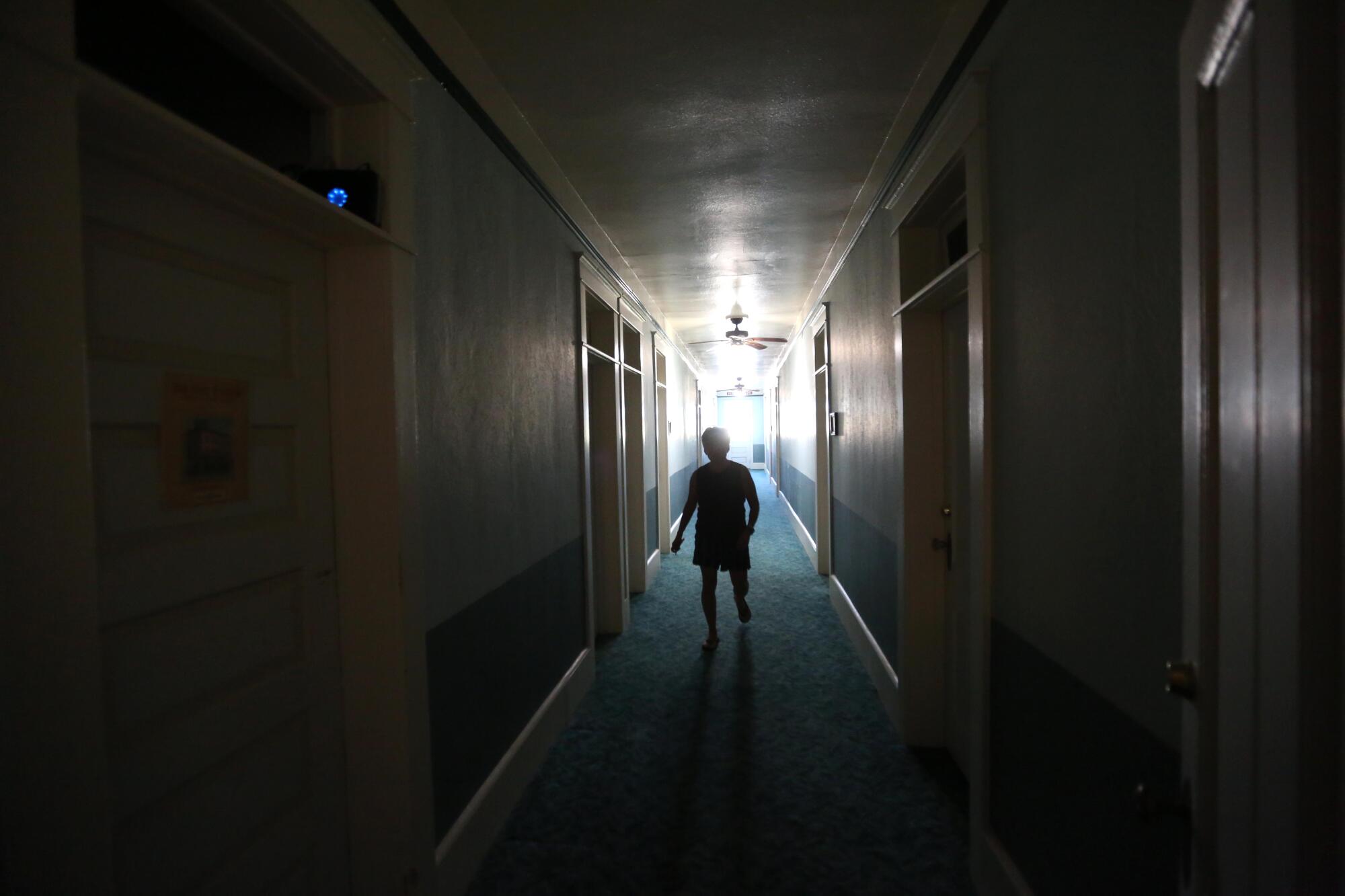
Maybe, they mused, she was the woman whose portrait hung at the end of the room: a young lady with pale skin, a stole hanging off her thin shoulders, looking away from the camera.
Klauer, imagining the ghostly sex worker’s life, suddenly turned serious.
“Women of that era had no alternative,” she said. “They needed to eat. They needed to survive. They may or may not have had children they were supporting. They couldn’t shovel s—. They couldn’t work in the mines. They couldn’t work in the kitchen. All the cooks were men; the servers were men.”
If she was haunting the hotel, the women said, more power to her.
Watch L.A. Times Today at 7 p.m. on Spectrum News 1 on Channel 1 or live stream on the Spectrum News App. Palos Verdes Peninsula and Orange County viewers can watch on Cox Systems on channel 99.
More to Read
Subscriber Exclusive Alert
If you're an L.A. Times subscriber, you can sign up to get alerts about early or entirely exclusive content.
You may occasionally receive promotional content from the Los Angeles Times.

